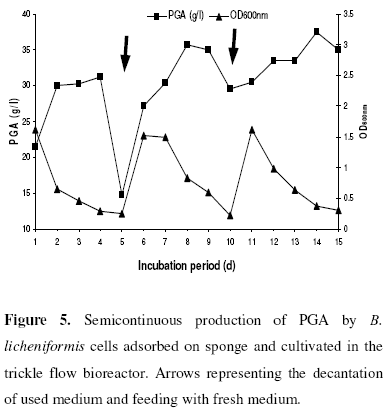Production of Polyglutamate (PGA) biopolymer by immobilized Bacilluslicheniformis strain-R was intensively investigated. Preliminary experiments were carried out to address the most suitable immobilization methodology. Entrapment of Bacillus cells in alginate-agar led optimal PGA production (36.75 g/l), with 1.32- and 2.18-fold increase in comparison with alginate- or K-carrageenan-immobilized cells, respectively. During semicontinuous cultivation of agar-alginate gel-cell mixture, production of PGA by 10 ml mixture was increased from 2nd to 3rd run whereas, increased till the 4th run using 15ml mixture. Adsorption was the most suitable immobilization technique for production of PGA and the sponge cubes was the preferred matrix recording 43.2 g/l of PGA with the highest cell adsorption. Furthermore, no PGA was detected when B. licheniformis cells were adsorbed on wood and pumice. Although luffa pulp-adsorbed cells recorded the highest PGA production (50.4 g/l), cell adsorption was the lowest. Semicontinuous cultivation of B. licheniformis cells adsorbed on sponge led to increase of PGA production till the 3rd run and reached 55.5 g/l then slightly decreased in the 4th run. The successful use of fixed-bed bioreactor for semicontinuous cultivation of B. licheniformis cells held on sponge cubes (3 runs, 96 hours/run) provides insight for the potential biotechnological production of PGA by immobilized cells.
Poly-g-glutamate; Bacillu slicheniformis; immobilization; bioreactor; semicontinuous production








